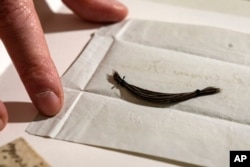What Made Beethoven Sick DNA From His Hair Offers Clues
Voice of America
25 Mar 2023, 11:38 GMT+10

NEW YORK - Nearly 200 years after Ludwig van Beethoven's death, researchers pulled DNA from strands of his hair, searching for clues about the health problems and hearing loss that plagued him.
They weren't able to crack the case of the German composer's deafness or severe stomach ailments. But they did find a genetic risk for liver disease, plus a liver-damaging hepatitis B infection in the last months of his life.
These factors, along with his chronic drinking, were probably enough to cause the liver failure that is widely believed to have killed him, according to a study published Wednesday in the journal Current Biology.

This Sunday marks the 196th anniversary of Beethoven's death in Vienna on March 26, 1827, at the age of 56. The composer himself wrote that he wanted doctors to study his health problems after he died.
'With Beethoven in particular, it is the case that illnesses sometimes very much limited his creative work,' said study author Axel Schmidt, a geneticist at University Hospital Bonn in Germany. 'And for physicians, it has always been a mystery what was really behind it.'
Since his death, scientists have long tried to piece together Beethoven's medical history and have offered a variety of possible explanations for his many maladies.
Now, with advances in ancient DNA technology, researchers have been able to pull genetic clues from locks of Beethoven's hair that had been snipped off and preserved as keepsakes. They focused on five locks that are 'almost certainly authentic,' coming from the same European male, according to the study.

They also looked at three other historical locks but weren't able to confirm those were actually Beethoven's. Previous tests on one of those locks suggested Beethoven had lead poisoning, but researchers concluded that sample was actually from a woman.
Scientists dissolved the pieces into a solution and fished out chunks of DNA, said study author Tristan James Alexander Begg, a biological anthropologist at the University of Cambridge.
Getting genes out was a challenge, since DNA in hair gets chopped up into tiny fragments, explained author Johannes Krause, a paleogeneticist at Germany's Max Planck Institute for Evolutionary Anthropology.
But eventually, after using up almost 3 meters of Beethoven's hair, they were able to piece together a genome that they could study for signs of genetic disease, Krause said.

While researchers didn't find any clear genetic signs of what caused Beethoven's gastrointestinal issues, they found that celiac disease and lactose intolerance were unlikely causes. In the future, the genome may offer more clues as we learn more about how genes influence health, Begg said.
The research also led to a surprising discovery: When they tested DNA from living members of the extended Beethoven family, scientists found a discrepancy in the Y chromosomes that get passed down on the father's side. The Y chromosomes from the five men matched each other - but they didn't match the composer's.
This suggests there was an 'extra-pair paternity event' somewhere in the generations before Beethoven was born, Begg said. In other words, a child born from an extramarital relationship in the composer's family tree.
The key question of what caused Beethoven's hearing loss is still unanswered, said Ohio State University's Dr. Avraham Z. Cooper, who was not involved in the study. And it may be a difficult one to figure out, because genetics can only show us half of the 'nature and nurture' equation that makes up our health.
But he added that the mystery is part of what makes Beethoven so captivating: 'I think the fact that we can't know is OK,' Cooper said.
 Share
Share
 Tweet
Tweet
 Share
Share
 Flip
Flip
 Email
Email
Watch latest videos
Subscribe and Follow
Get a daily dose of Europe Sun news through our daily email, its complimentary and keeps you fully up to date with world and business news as well.
News RELEASES
Publish news of your business, community or sports group, personnel appointments, major event and more by submitting a news release to Europe Sun.
More InformationInternational
SectionBeijing crowds cheer AI-powered robots over real soccer players
BEIJING, China: China's national soccer team may struggle to stir excitement, but its humanoid robots are drawing cheers — and not...
COVID-19 source still unknown, says WHO panel
]LONDON, U.K.: A World Health Organization (WHO) expert group investigating the origins of the COVID-19 pandemic released its final...
Fox faces $787 million lawsuit from Newsom over Trump phone call
DOVER, Delaware: California Governor Gavin Newsom has taken legal aim at Fox News, accusing the network of deliberately distorting...
DeepSeek faces app store ban in Germany over data transfer fears
FRANKFURT, Germany: Germany has become the latest country to challenge Chinese AI firm DeepSeek over its data practices, as pressure...
Canadian option offered to Harvard graduates facing US visa issues
TORONTO, Canada: Harvard University and the University of Toronto have created a backup plan to ensure Harvard graduate students continue...
Israel should act fast on new peace deals, Netanyahu says
JERUSALEM, Israel: Israeli Prime Minister Benjamin Netanyahu says that Israel's success in the war with Iran could open the door to...
Business
SectionLululemon accuses Costco of selling knockoff apparel
Vancouver, Canada: A high-stakes legal showdown is brewing in the world of athleisure. Lululemon, the Canadian brand known for its...
Shell rejects claim of early merger talks with BP
LONDON, U.K.: British oil giant Shell has denied reports that it is in talks to acquire rival oil company BP. The Wall Street Journal...
Wall Street extends rally, Standard and Poor's 500 hits new high
NEW YORK, New York - U.S. stock markets closed firmly in positive territory to start the week Monday, with the S&P 500 and Dow Jones...
Canadian tax on US tech giants dropped after Trump fury
WASHINGTON, D.C.: On Friday, President Donald Trump announced that he was halting trade discussions with Canada due to its decision...
Trump-backed crypto project gets $100 million boost from UAE fund
LONDON, U.K.: A little-known investment fund based in the United Arab Emirates has emerged as the most prominent public backer of U.S....
DIY weight-loss drug trend surges amid high prices, low access
SAN FRANCISCO, California: Across the U.S., a growing number of people are taking obesity treatment into their own hands — literally....













